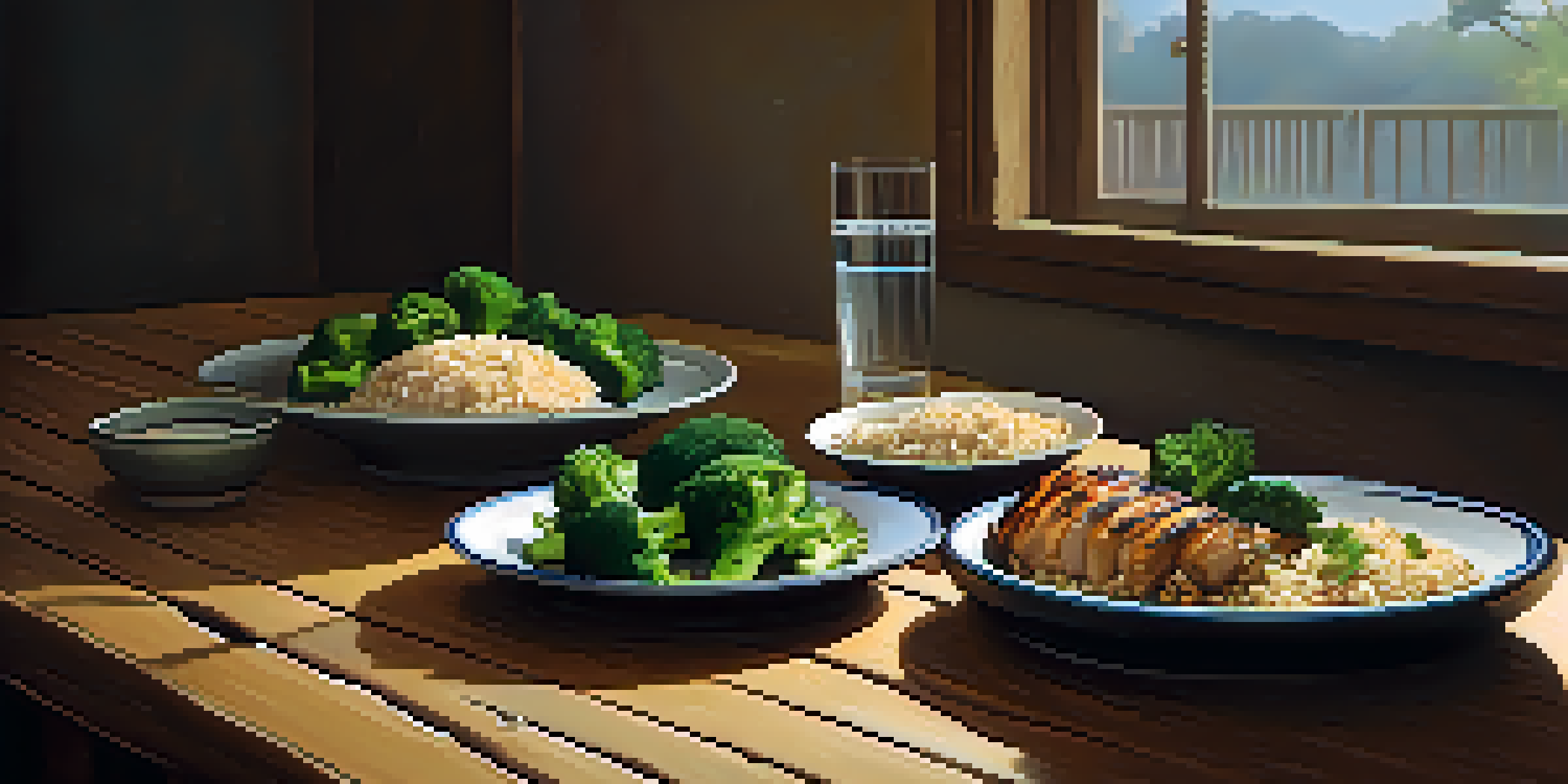Pre-Performance Meals: What Dancers Should Eat Before Shows

Understanding the Importance of Pre-Performance Nutrition
Nutrition plays a crucial role in a dancer's performance, acting as fuel for the body. Just like a car needs gasoline to run smoothly, dancers require the right nutrients to stay energized and focused on stage. A well-balanced meal can enhance stamina, improve concentration, and even aid in recovery after a demanding performance.
You are what you eat, so don't be fast, cheap, easy, or fake.
Eating the right foods before a show can also help reduce anxiety and improve overall mood. When dancers nourish their bodies properly, they feel more confident and less distracted by hunger or fatigue. This mental clarity can make a significant difference in their performance, allowing them to fully express themselves through movement.
It's important to remember that not all foods are created equal. Dancers should aim for meals that provide a balance of carbohydrates, proteins, and healthy fats to optimize their energy levels. By understanding the importance of what they eat, dancers can take control of their performance outcomes.
Timing Your Meals: When to Eat Before a Performance
Timing is everything when it comes to pre-performance meals. Dancers should aim to eat their main meal about 2-3 hours before going on stage. This allows enough time for digestion, ensuring that they won’t feel sluggish or overly full during their performance.

If a performance is approaching and it’s less than two hours away, a light snack can be beneficial. Something like a banana or a small yogurt can provide a quick energy boost without overwhelming the digestive system. It’s all about finding that sweet spot where energy levels are high, but discomfort is low.
Nutrition Fuels Dancer Performance
A balanced diet enhances stamina, focus, and recovery for dancers on stage.
Listening to one’s body is key in determining the best timing for meals. Each dancer may have their own preferences based on experience, so experimenting with timing can help find what works best for individual needs. Keeping a consistent routine can further enhance performance stability.
Key Nutrients for Optimal Energy and Performance
When planning pre-performance meals, it’s essential to focus on key nutrients that will provide sustained energy. Carbohydrates are the primary source of fuel for dancers, providing the energy needed for those dynamic movements. Whole grains, fruits, and vegetables should be staples in their meals leading up to a show.
Nutrition is not just about eating, it's about learning to live.
Protein also plays a vital role in repairing and building muscles, especially after rigorous rehearsals. Including sources like chicken, fish, or legumes can be beneficial. Healthy fats, found in foods like avocados and nuts, are equally important as they help keep energy levels steady throughout the performance.
By incorporating a variety of these nutrients, dancers can create meals that support their physical demands. A well-rounded plate not only enhances performance but also promotes overall health, allowing dancers to thrive both on and off the stage.
Sample Pre-Performance Meal Ideas for Dancers
When it comes to meal ideas, simplicity and nutrition should go hand in hand. A classic pre-performance meal could be brown rice paired with grilled chicken and steamed broccoli. This combination offers a good blend of carbohydrates, protein, and vitamins to fuel a dancer's performance.
Another great option is a whole-grain pasta dish topped with a light tomato sauce and mixed vegetables. This meal is not only satisfying but also packs a punch of energy-boosting carbohydrates. Adding a side of fruit can provide a refreshing sweetness and additional vitamins.
Timing Meals for Best Results
Eating main meals 2-3 hours before a show and opting for light snacks closer to performance optimizes energy levels.
For those who prefer a lighter meal, a smoothie made with spinach, banana, and Greek yogurt can be an excellent choice. It’s easy to digest, packed with nutrients, and can be consumed on the go. Having a variety of meal options allows dancers to find what works best for their body and preferences.
Hydration: The Unsung Hero of Performance Prep
Hydration is often overlooked, but it’s just as vital as nutrition for dancers preparing for a performance. Staying hydrated helps maintain energy levels and supports optimal muscle function, which is crucial during high-intensity dancing. Water should be a dancer’s best friend, and they should aim to drink enough throughout the day leading up to the show.
In addition to water, electrolyte-rich drinks can be beneficial, especially after a long rehearsal. These drinks help replenish lost minerals and keep energy levels stable. However, dancers should be cautious with sugary drinks, as they can lead to energy crashes.
Maintaining hydration doesn't just stop before the show; it’s a continuous process. Dancers should make it a habit to carry a water bottle with them to ensure they stay hydrated during rehearsals, breaks, and even on stage. Proper hydration contributes significantly to overall performance and recovery.
Foods to Avoid Before a Performance
While there are many foods that can enhance performance, there are also those that should be avoided. Heavy, greasy foods can lead to sluggishness and discomfort, making it difficult to concentrate on the performance. Dancers should steer clear of fast food or meals high in saturated fats right before a show.
Additionally, foods that are high in sugar can cause a quick spike in energy followed by a crash, which is not ideal when trying to maintain stamina on stage. It’s best to limit sugary snacks and desserts leading up to a performance.
Hydration is Key for Dancers
Staying hydrated supports energy levels and muscle function, crucial for high-intensity performances.
Lastly, be mindful of foods that can cause digestive issues, such as beans or dairy products for some individuals. Each dancer has different tolerances, so it’s essential to know what foods work best and what might disrupt focus during a performance.
The Role of Personal Preferences and Dietary Restrictions
Every dancer is unique, and personal food preferences play a significant role in pre-performance nutrition. Some may thrive on a vegetarian diet, while others may require meat for their protein sources. Understanding one’s own dietary needs and preferences can help in crafting the perfect pre-performance meal plan.
For those with dietary restrictions, there are plenty of nutritious options available. Gluten-free grains, plant-based proteins, or dairy alternatives can be integrated into meals without sacrificing taste or performance. The key is to experiment and find combinations that work well for individual bodies.

Ultimately, listening to one's body and adapting meals accordingly is essential. Keeping a food journal can also help dancers track how different meals affect their performance, allowing for adjustments as needed. Embracing personal preferences leads to a more enjoyable and effective nutrition journey.